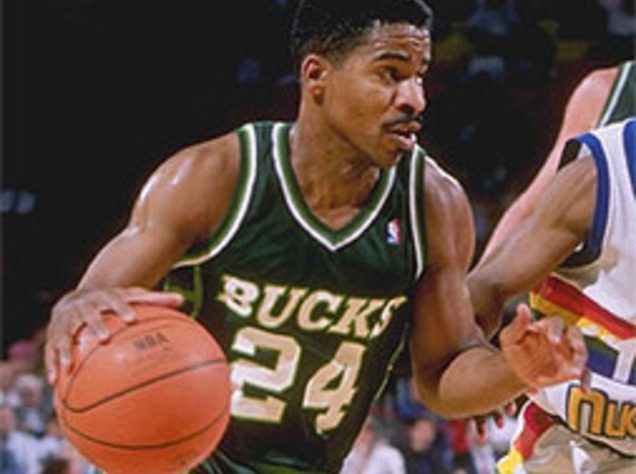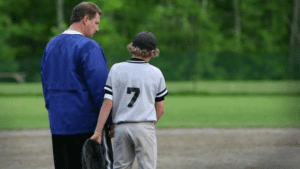We recently had the pleasure of interviewing former NBA guard and long-time pro coach, Jay Humphries, who is one of our top private basketball coaches on CoachUp. Jay played in the NBA from 1984-95; he was Phoenix’s 13th overall draft pick in ’84, coming out of the University of Colorado. He went on to play for the Milwaukee Bucks, Utah Jazz and Boston Celtics, averaging 11.1 points and 5.5 assists over his career. Currently (as of 4/2013), Jay sits at 76th all-time in assists and 90th all-time in steals. Here’s a quick synopsis of Jay’s coaching background:
A few years after his playing days, Humphries made the natural transition to basketball coaching. In 2001, he worked as an associate head coach for the Chinese Basketball Association’s Jilin Northeastern Tigers and had a five-year stint in the Korean Basketball League, three as associate head coach for the Wonju TG Xers, and two as the Inchon ET Land Black Slamer head coach.
Humphries helped guide Wonju to a pair of championships before returning to the United States and working as the first coach for the NBA Development League’s Reno Big Horns (2008-10), and then returning to China for a year to lead the Foshan Long Lions.
…He has also worked in advance scouting for the Los Angeles Lakers, been a Phoenix Suns assistant coach (for Mike D’Antoni in 2007-08) and served on the Memphis Grizzlies’ NBA Summer League coaching staff. [Source]
Check out the great conversation we had with Jay, then head over to Jay’s CoachUp profile to book private lessons!
Q: Did you have any coaches growing up that were really influential, and did you ever take private basketball lessons when you were growing up?
As a younger player, my Dad did a lot of my coaching growing up. And I always played park ball. What really helped my fundamentals at a young age was I went to John Wooden’s basketball camps. That’s where I got a good fundamental base and then in high school, my coach helped me a lot as well.
Q: Your playing career is really interesting and we discovered that you did a tour of China in 1998 with NBA legends like Oscar Robertson and Kareem Abdul-Jabbar. What was it like hanging out and playing with those guys?
Well it was my first time actually spending time around Oscar Robertson. He coached our team, so it was a great experience just to be able to pick a legend’s brain, just sitting around talking and getting to know him in a different atmosphere. But you know Kareem, Tom Chambers, Adrian Dantley, a lot of those guys who went on that trip with us, I had known previously from playing together. Overall, at the tail end of your career, when you get a chance to go experience a different part of the world and to be with your friends and extend your basketball playing a little bit, it always turns out good.
Q: Wow, that is really cool. How did you get into coaching after your playing career? Did it just come naturally?
Well, it pretty much came naturally. As a point-guard at all the different levels of basketball, I always had to be a leader on the floor and to understand the inter-mixings of all the different positions. As I became a veteran player in the NBA, my coaches came to me for input about things that were happening on the floor. Del Harris, one of my coaches in Milwaukee who is a Hall of Fame-caliber coach, really started to sit down and talk with me about coaching: what it takes to be a successful coach and how to make a good transition from player to coach.
Q: How did you get the opportunity to coach overseas in Asia? Were there any concerns about language barrier or anything like that, or did they just give you an offer based on your great experience?
Well it kind of came from touring there and playing the games with the NBA Legends. Also, I’m a part owner of a camp/basketball facility in Eugene, Oregon called the United States Basketball Academy, and we train the Asian national teams by setting up games and doing different things. While in the midst of training, I was working with some guys on a team in China, and that team offered me a position. It was actually to come over to consult, coach, organize the team, and put together their training camp and some offices. As that went on, they came to me and offered me a job for the rest of the season. We had success. We went from a 12th place team to a 9th place team, made the playoffs, and had some success. That was my first year in China, and Yao Ming was playing in China at the time. And then I came back to America after the season and was working with some Korean teams back in the states. Pretty much the same thing happened, so I ended up staying in Korea for 6 years and winning some championships over there.
Sometimes, you think that it would be a problem when it comes to communication. Basketball is an American sport, so what I tried to do was teach my camps in English. But, the cultures are so different that I made it a point to meet culturally in the middle. I happen to believe that the culture comes first, so what I tried to do was meet in the middle with some of their cultural differences and what I kind of knew wasn’t what I wanted to teach. As time went on, the players started pulling more my way.
Q: That’s an interesting story, did you notice any difference in the work ethic or type of character in players over there that is different than what you see in American players?
When it comes to sports and basketball in China, they start playing basketball and are designated a player at a very early age. At that early age, someone may come and take you away from your family, pay your family, and say that you’re going to be a basketball player. So, the whole treatment changed things because sometimes they are forced to play instead of playing out of love and respect for the game.
Q: Wow, that is really intense. So, what made you pursue private coaching when you came back to the US? Was that something you were planning on or did it just come up as an opportunity?
It kind of just came up. I just turned 50, and I didn’t want to continue going overseas even though I had those opportunities. I’ve coached in the NBA Developmental League, and I’ve coached in the NBA as an assistant coach but things didn’t materialize with a job this year. So, I thought that since I am in the gym everyday trying to take care of myself, I might as well try to help out the kids there. I try to teach them how to do stuff the right way, so I was approached by some high schoolers to see if I could help them individually. That’s how my relationship with CoachUp came about. I’m in the gym and I’m helping kids. I love when I can clearly see someone make an improvement from one level to the next. It’s not about each player being able to play high school basketball, make an all star team, or play pro. It’s just being able to make progress and play the game correctly, the way it is supposed to be played.
Q: As a player I’m sure you committed yourself in the offseason to improving as a player. As a private coach, how has that translated to growing as a coach and making sure that you are constantly improving your ability to coach youth athletes?
Well as I said in the beginning, you really do improve individually as a player in the offseason. During the season, you improve your overall knowledge as a player of the game. It’s a year-round thing. I’m learning stuff everyday as a coach. What I did as a player to improve in the summer is totally different than what the younger players do now because of the different technologies that have evolved. I think that if I had some of the technologies, medicines, and different things that are available now, I may have been able to have a longer career. It’s really interesting because I try to do as much of my athletes’ workouts with them, so I can have a good understanding of what they are going through. I think that allows me to be a better coach.
Q: How has the game evolved from when you were an NBA player to now? What are the high level (high school, college, pro) trends that you have seen lately now that the game has evolved?
You know when I played, a point guard was a point guard, a shooting guard was a shooting guard, all down the line. I think now with the European influx of players, they don’t teach you post moves just because you are 7-feet tall. They teach you how to play the game. You create and teach versatility. You don’t take anything away from anybody, but instead give them everything and see what they can do. It’s just a different aspect in teaching the game because even if you are a 7-footer, the more limber you are and the better footwork you have facing the basket instead of just having your back the basket, allows you to open up different aspects that can make you more valuable to the next level of the sport.
Q: That’s awesome. So the final question would be is if you had to give one piece of advice to aspiring athletes looking to make it to the highest levels what would that be?
No matter what, you have to respect the game. If you respect the game that means that you will do the things that it takes to get better. Once you respect the game and you respect yourself, don’t burn any bridges along the way. I’ve had a great basketball life. I’m a basketball lifer. Ever since I was a kid, basketball has been what I do. There have been guys who have great talents, but aren’t great people and don’t get the next opportunity because of some bad decision they have made along the way in life. And I have seen some of the great ones, so I have always said that if you respect the game and you respect yourself, you won’t run into those problems. Sometimes at a young age, you don’t realize it, but you can make one decision that may be wrong and it directs you in a different path for the rest of your life. So that’s what I talk to younger kids about – having respect for the game, yourself, and your family.
Thanks for reading, and remember to head over to Jay’s CoachUp profile to book private lessons (Jay is located in the South Denver area). We have basketball coaches nationwide, and while not all of them have played in the NBA like Jay, we’re confident that CoachUp can connect you with an excellent coach who can help take your game to the NEXT LEVEL!
How useful was this post?
Click on a star to rate it!
Average rating 0 / 5. Vote count: 0
No votes so far! Be the first to rate this post.




